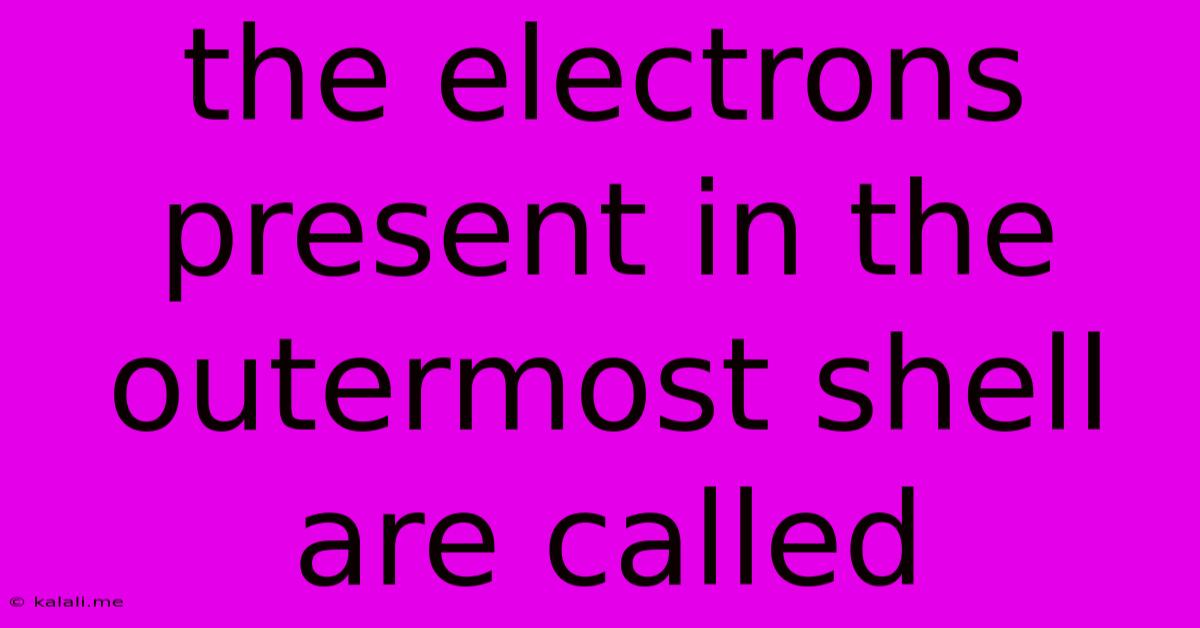The Electrons Present In The Outermost Shell Are Called
Kalali
Jun 14, 2025 · 3 min read

Table of Contents
The Electrons Present in the Outermost Shell Are Called Valence Electrons
Meta Description: Learn about valence electrons – the outermost shell electrons that determine an atom's chemical properties and bonding behavior. This article explains their significance in chemistry and provides examples.
Atoms are the fundamental building blocks of matter, and their behavior is largely dictated by the arrangement of their electrons. These negatively charged particles orbit the atom's nucleus in specific energy levels or shells. Understanding the electrons in the outermost shell is crucial to comprehending chemical reactions and the properties of elements. So, what are these crucial electrons called? They are called valence electrons.
What are Valence Electrons?
Valence electrons are the electrons located in the outermost shell of an atom, also known as the valence shell. These electrons are the furthest from the atom's nucleus and are therefore the most loosely bound. This loose binding makes them the most readily involved in chemical reactions and bonding. The number of valence electrons an atom possesses significantly influences its chemical reactivity and the types of bonds it can form.
Why are Valence Electrons Important?
The importance of valence electrons stems from their role in determining an element's chemical properties and its ability to bond with other atoms. Here's how:
-
Chemical Bonding: Valence electrons are directly involved in the formation of chemical bonds. Atoms tend to react in ways that achieve a stable electron configuration, often by gaining, losing, or sharing valence electrons to fill their outermost shell. This leads to the formation of ionic bonds (transfer of electrons) or covalent bonds (sharing of electrons).
-
Reactivity: Elements with a nearly full or nearly empty valence shell are generally more reactive than those with a half-filled or completely filled valence shell. This is because atoms strive for stability, and achieving a full valence shell (often eight electrons, following the octet rule) provides this stability.
-
Predicting Chemical Behavior: Knowing the number of valence electrons allows chemists to predict how an element will behave in a chemical reaction. For example, elements with one or two valence electrons tend to lose these electrons to form positive ions, while elements with six or seven valence electrons tend to gain electrons to form negative ions.
Determining the Number of Valence Electrons
The number of valence electrons can be determined from an element's position on the periodic table. The group number (vertical column) of an element in the periodic table generally corresponds to the number of valence electrons. For example, elements in Group 1 (alkali metals) have one valence electron, while elements in Group 18 (noble gases) have eight valence electrons (except for helium, which has two). However, this rule has exceptions, particularly for transition metals.
Examples of Valence Electrons in Action
-
Sodium (Na): Sodium has one valence electron. It readily loses this electron to form a Na⁺ ion, achieving a stable electron configuration.
-
Chlorine (Cl): Chlorine has seven valence electrons. It readily gains one electron to form a Cl⁻ ion, achieving a stable octet.
-
Oxygen (O): Oxygen has six valence electrons and often forms two covalent bonds to complete its octet.
In conclusion, valence electrons are the key players in the world of chemical bonding and reactivity. Their number and arrangement dictate how atoms interact, forming the basis for the diverse properties and behaviors of matter. Understanding valence electrons is fundamental to grasping the principles of chemistry and predicting chemical reactions.
Latest Posts
Latest Posts
-
Greatest Common Factor Of 48 And 54
Jun 14, 2025
-
How To Write Phd Title After Name
Jun 14, 2025
-
Which Of The Following Is Not Correct About Firewalls
Jun 14, 2025
-
Difference In Supply And Quantity Supplied
Jun 14, 2025
-
What Should Be Changed To Make The Following
Jun 14, 2025
Related Post
Thank you for visiting our website which covers about The Electrons Present In The Outermost Shell Are Called . We hope the information provided has been useful to you. Feel free to contact us if you have any questions or need further assistance. See you next time and don't miss to bookmark.